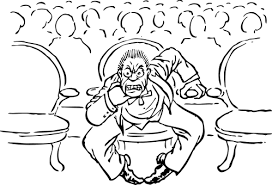Using Science To Justify Bad Behavior
 The development of true science as a process for understanding the Universe has been one of the most important advancements in our species. It has directly led to the improvement of millions of lives. Through increasing technology, we have helped restore damaged environments, we have provided more food to those in need, and created a standard of living that would have been absolutely unthinkable just a few generations ago.
The development of true science as a process for understanding the Universe has been one of the most important advancements in our species. It has directly led to the improvement of millions of lives. Through increasing technology, we have helped restore damaged environments, we have provided more food to those in need, and created a standard of living that would have been absolutely unthinkable just a few generations ago.
The practices of science offer us a dependable toolbox that we can draw on in order to solve complex and difficult problems, as well as to create new knowledge. The most useful of these tools include demanding evidence, planing and carrying out investigations, creating models, analyzing and interpreting data, and doing research. Becoming proficient with these skills can help a person to really orient themselves towards truth.
Of course science doesn’t have a perfectly clean record. Tyrants have hijacked the expertise of scientists and engineers in order to create more powerful weaponry and promote their own power, the actions of these individuals does not however invalidate the importance or significance of the contributions that science and engineering have made to our overall wellbeing.
Using Science To Behave Unscientifically
While science as a means of learning about the Universe is powerful, we as people are all too often subject to the human frailties of pride, arrogance, and status seeking. We love to be seen as experts, and to have our knowledge validated. Which can lead us to act very unscientifically.
Unfortunately many who spend their lives in pursuit of scientific knowledge tend to close the door behind themselves. Rather than encouraging others to use the same tools of science that they utilized, they instead insist that they are experts and that other people simply need to trust them, and take their word for it. In this way, they stifle the scientific mindset in others. They view their opinions as absolute, because those opinions are backed by the letters “Ph.D” and are therefore endowed with authority. As such, they often look down on the opinions of anyone who is not in academia. Those who are ego driven can sometimes forget that great minds like Newton, Galileo, Darwin, and many others didn’t get IRB approval for their projects, nor have their papers published in this or that peer reviewed journal. They forget that Gregor Mendell was just a monk, in a forgotten monastery. In short, they forget that there are a lot of people more intelligent than themselves who do not have any letters after their name, but who are just as capable of performing real science as they are.
It is the stifling of science in others that is the problem. Whenever we discourage others from thinking scientifically, because we want them to trust our expertise, we are using science to act unscientifically. Whenever we say to someone that they must believe us, and that there is no need to demand our evidence, we are acting antithetical to science.
Anyone Can Do Science
The purpose of science is to teach people to think scientifically. It is to encourage children to demand evidence from their teachers. It is to train undergraduate students to demand that their professors back up their claims with proof. It is to promote the processes that lead to the advancement of mankind’s understanding of the Universe.
Yet too often we hear phrases like “99% of scientists agree with…” or “the science is settled.” These phrases are incredibly inappropriate as they are completely unscientific. Science is never settled, and scientists rarely agree. Even if they do agree, this agreement is meaningless, because belief does not endow something with truth. Too often we look down on those who question “science.” Despite the fact that questioning knowledge is at the very core of what science is supposed to be about.
We must recognize that even a 12 year old child can do real science. It was after all a child who discovered that hot water freezes faster than cold water. A young student is capable of thought, and entitled to opinions that run contrary to those held by any established Doctorate. The child must be taught not to doubt themselves, or to back down from their opinions just because someone with letters behind their name disagrees with them.
We must teach our children to use the tools of science, rather than to believe the conclusions of others at face value. We must teach them to do their own research, investigations, experimentations, data analysis, and to draw their own intelligent conclusions.
Otherwise, we are using science to justify acting unscientifically.
Why Bring This Up?
My purpose is not to belittle science. Nothing has been more important to the advancement of our species than the creation of tools, procedures, and rules that help us to probe and understand the Universe. It is important that these processes continue unfolding. Those who justify acting unscientifically because they view themselves as experts do incalculable damage to that progress. We must continue to value the very same scientific processes that helped Galileo prove that Jupiter has moons, and that allowed Darwin to prove that animals change over time. Thus allowing future generations to topple the false ideas that are still prevalent in our thinking today. Unfolding new dimensions on our perspective of the Universe.
Incidentally, it is important to note that 99.9% of the individuals in science do behave scientifically. More often than not, it is politicians, and not scientists who use science to stifle scientific thought.
You Can Judge Or You Can Celebrate
Those looking to dismiss science as a bunch of stuffy academics, with big egos, who promote their own expertise will certainly be able to find plenty of examples to support their own intolerance of science. However, the imperfections of those charged with carrying science forward does not invalidate the power or impact that science has had on society. We can dismiss science all together, based on these imperfections, or we can be wise and realize that science is a tool of incalculable power.
Listening To Experts
The value of listening to experts should not be minimized. Experts are individuals who have spent a lifetime in a particular field, and who almost certainly understand it to a much greater depth than we do. They play an important role as guides in our own education. More often than not, they are going to be correct. If our approach is take a contrarian attitude towards science, then we will inevitably spend a lot of time arguing against those who are usually right. Rather than being a contrarian, our goal should be to demand proof before we accept an expert’s arguments at face value.
When legitimate experts come to us with knowledge about the world, we aught to stop and listen. Then we aught to ask for their reasoning and evidence. Not because we assume that they are wrong, but because, even though they are probably right, as intelligent beings we must do our own due diligence and our own research. Experts are knowledgable guides, who have much to offer us! This does not however excuse us from having to pass through our own scientific process in order to validate their views.
Don’t Use Science To Act Unscientifically
On the flip side it is important that those of us who value the learning that has come from science, not use that knowledge to justify encouraging others to behave unscientifically. We must encourage and foster a scientific attitude in others. Which above all means teaching them to demand evidence, and to doubt a premise until it has withstood their own scientific due diligence. We must never insist that others just take our word on something, because we are an expert.
Read About This Same Phenomenon From The Perspective of Religion




